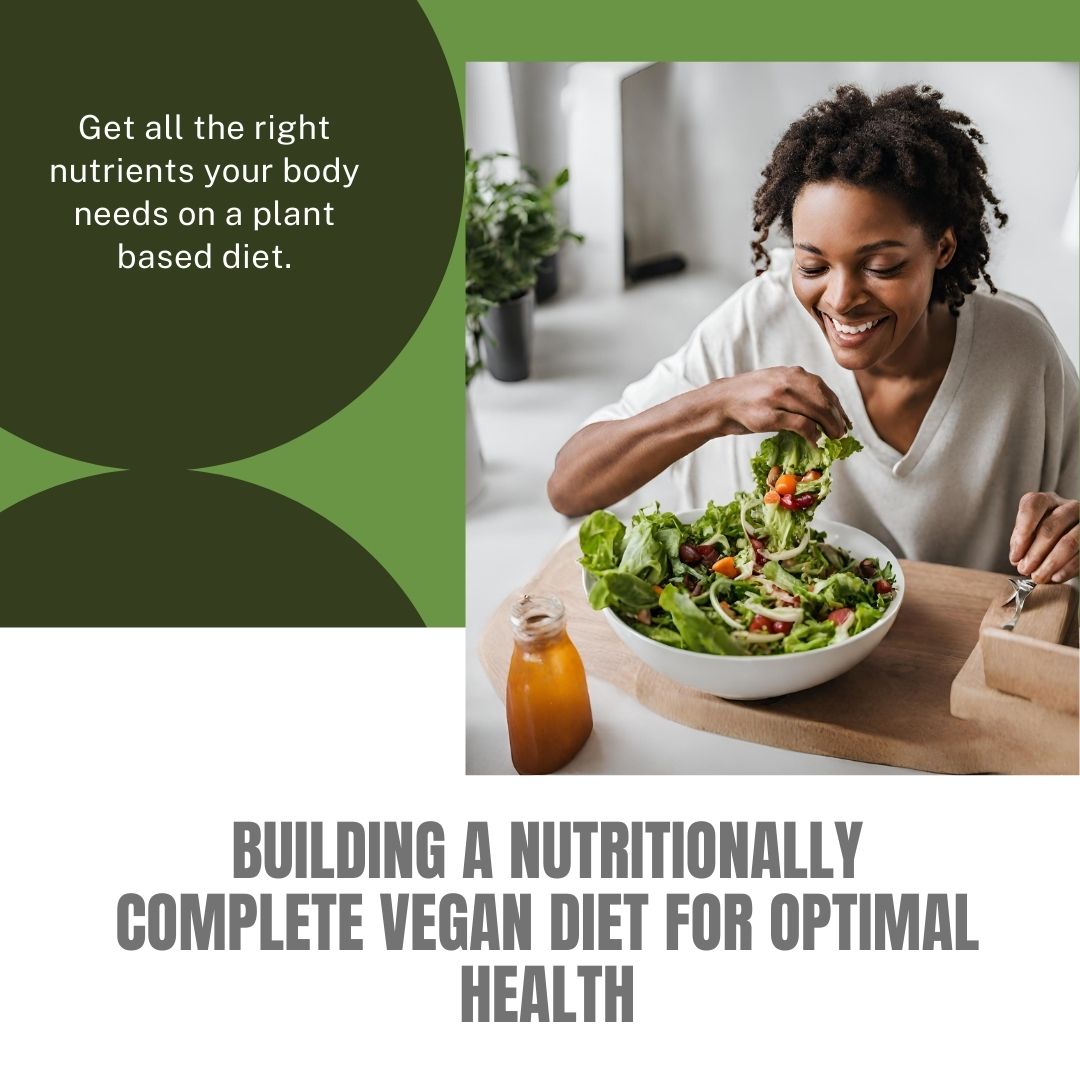Plant-based diets are booming in popularity, thanks to their ethical, environmental, and health benefits. But one big question remains: Can you get all the nutrients you need on a vegan diet? The answer is a resounding yes—with a little know-how! Let’s dive into what it takes to build a nutritionally complete vegan diet that keeps you feeling amazing.
Quick Note: The information in this blog is for general informational purposes only and is not intended as medical advice. I am not a healthcare professional, and while this post is based on research and personal experience, individual nutritional needs vary. If you have specific health concerns or dietary questions, consult a registered dietitian or healthcare provider for personalized guidance.
The Power of Plants: How to Build a Nutritionally Complete Vegan Diet
A well-planned vegan diet is a goldmine of essential nutrients. It’s naturally high in fiber, vitamins (like C, E, and K), and minerals (like magnesium and potassium). Plus, it’s typically lower in saturated fat and cholesterol compared to animal-based diets, making it a heart-friendly choice.
But to ensure you’re getting everything your body needs, there are a few key nutrients to keep in mind:
- Vitamin B12: Since it’s mostly found in animal products, vegans need to get it from fortified foods or supplements.
- Iron: Plant-based sources like legumes and leafy greens are great, but they’re not absorbed as easily as animal-based iron. Pair them with vitamin C-rich foods to boost absorption.
- Calcium: Dairy isn’t the only source! Look for calcium-fortified plant milks, tofu, and leafy greens.
- Omega-3s: Fatty fish isn’t the only way to get these essential fats. Flaxseeds, chia seeds, and walnuts contain ALA, which the body can convert to omega-3s—but not very efficiently. Some vegans opt for an algae-based omega-3 supplement just to be safe.
Recognizing Signs of Nutritional Deficiency in a Vegan Diet
Even with the best intentions, it’s possible to fall short on certain nutrients—especially if you rely too much on processed vegan foods. Mock meats can be high in sodium and additives, and sugary plant-based treats aren’t always the healthiest choice. Just because something is plant-based doesn’t automatically mean it’s good for you!
If you’re missing key nutrients, you might notice:
- Low energy and fatigue
- Brittle hair and nails
- Trouble concentrating
- Frequent colds and infections
- Pale skin
If anything feels off, check in with a healthcare professional who can help tailor your diet or recommend supplements.
Protein Completeness & Meal Combinations for a Nutritionally Complete Vegan Diet
One of the biggest myths about a vegan diet is that it’s hard to get enough protein. The truth? There are tons of plant-based protein sources—you just need to mix and match! While animal proteins contain all nine essential amino acids, some plant proteins are lower in one or two. But don’t worry; you can easily get complete protein throughout the day by eating a variety of foods, such as:
- Beans and rice
- Hummus with whole wheat pita
- Peanut butter on whole-grain toast
- Lentils and quinoa
Your body is smart and stores amino acids, so as long as you eat a variety of plant-based proteins over the course of the day, you’re all set.
Building a Balanced Vegan Plate for Optimal Nutrition
To truly thrive on a plant-based diet, it helps to go beyond just meeting basic nutrient needs. Here are a few extra tips:
- Eat the rainbow: Different colors in fruits and veggies mean different nutrients. Variety is key!
- Meal prep and plan: Having a plan makes it easier to hit all your nutritional goals without stressing.
- Have fun in the kitchen: Experiment with new recipes, flavors, and plant-based staples like lentils, tempeh, and tofu.
Practical Meal Planning Tips for a Nutritionally Complete Vegan Diet
Switching to a plant-based diet doesn’t have to be overwhelming! Here are some simple ways to make meal planning a breeze:
- Stock up on essentials: Keep your pantry filled with PLANT-BASED PANTRY STAPLES like beans, lentils, whole grains, nuts, and seeds.
- Batch cook: Prep big batches of grains, beans, or roasted veggies so meals come together quickly.
- Keep it simple: You don’t have to cook elaborate meals every day. A hearty salad, grain bowl, or veggie stir-fry can be just as satisfying as a complex dish.
Planning Makes Perfect: Setting Yourself Up for Success
Starting a plant-based diet is exciting, but it can feel like a lot at first. That’s where a little planning goes a long way! Check out the PLANT-BASED ROADMAP section on our website—it’s packed with tools and guidance to help you set goals, explore your options, and create a personalized strategy that fits your life.
By planning, making informed choices, and keeping variety in your diet, you can build a nutritionally complete vegan diet that’s both nourishing and enjoyable. Remember, this is your journey—make it work for you!
Resources to Help You Thrive
- ACADEMY OF NUTRITION AND DIETETICS: A great resource for science-backed information on plant-based diets.
- PHYSICIANS COMMITTEE FOR RESPONSIBLE MEDICINE: Offers meal planning guides and the latest research on plant-based nutrition.
- WORLD HEALTH ORGANIZATION: Provides insights on how plant-based diets impact health, sustainability, and the environment.
By understanding what your body needs, making smart choices, and seeking guidance when needed, you can enjoy all the benefits of a nutritionally complete vegan diet. The key? Keep your plate diverse, colorful, and balanced—it’s the best way to fuel your health and happiness!






